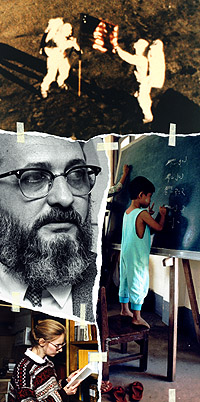Education
During the 1970s the WCC was the centre of pioneering work on education for liberation. Its adult basic education programme supported literacy and education for development in Latin America and Africa.
Programmes organized by the World Council have developed new methodologies and trained
leaders for a rich variety of ways of participatory and community Bible study.
A key WCC emphasis has been the link between learning ecumenically and the renewal of the church. This central role of education was accented by the WCC's assembly in Nairobi in 1975:
by and for
the whole
church
The WCC's role has been one of enabling and equipping churches for their own educational ministries. It has continued the work of the Theological Education Fund, inaugurated in 1958 to support ministerial training in the churches of the South. Through the WCC scholarships programme thousands of students have gained an ecumenical education abroad.
The entire life of the Christian community is educative, and the quality of its worship and work as a whole determines the quality of the nurture of its members. Each local congregation is called to be a community which reflects the care and love of God for all people. In such a fellowship all members have their part and must contribute to the life of the whole. Christian education is a vital part of this, for it belongs to the whole church and is the responsibility of all its members.

Moving clockwise from top, the images are 1: 20 July 1969: First landing on the moon (Nasa/Science Photo Library/London); 2: Myanmar, 1996: Mary Chapman school for deaf children in Yangon (Peter Williams/WCC); 3: Moscow, Russia, 1994: Student at St. Tichon Orthodox Theological Institute (Peter Williams/WCC); 4: Paulo Freire (John Taylor/WCC).